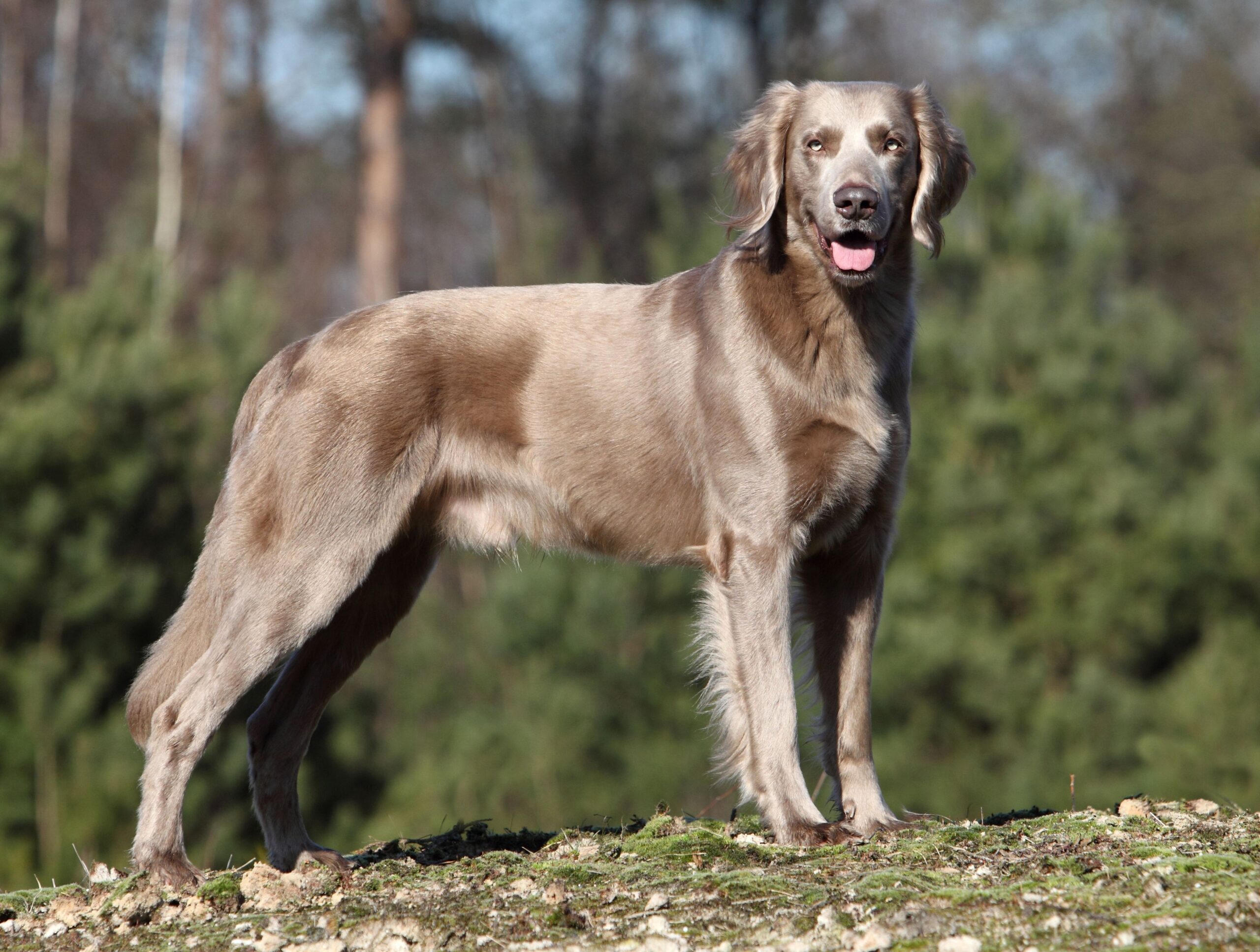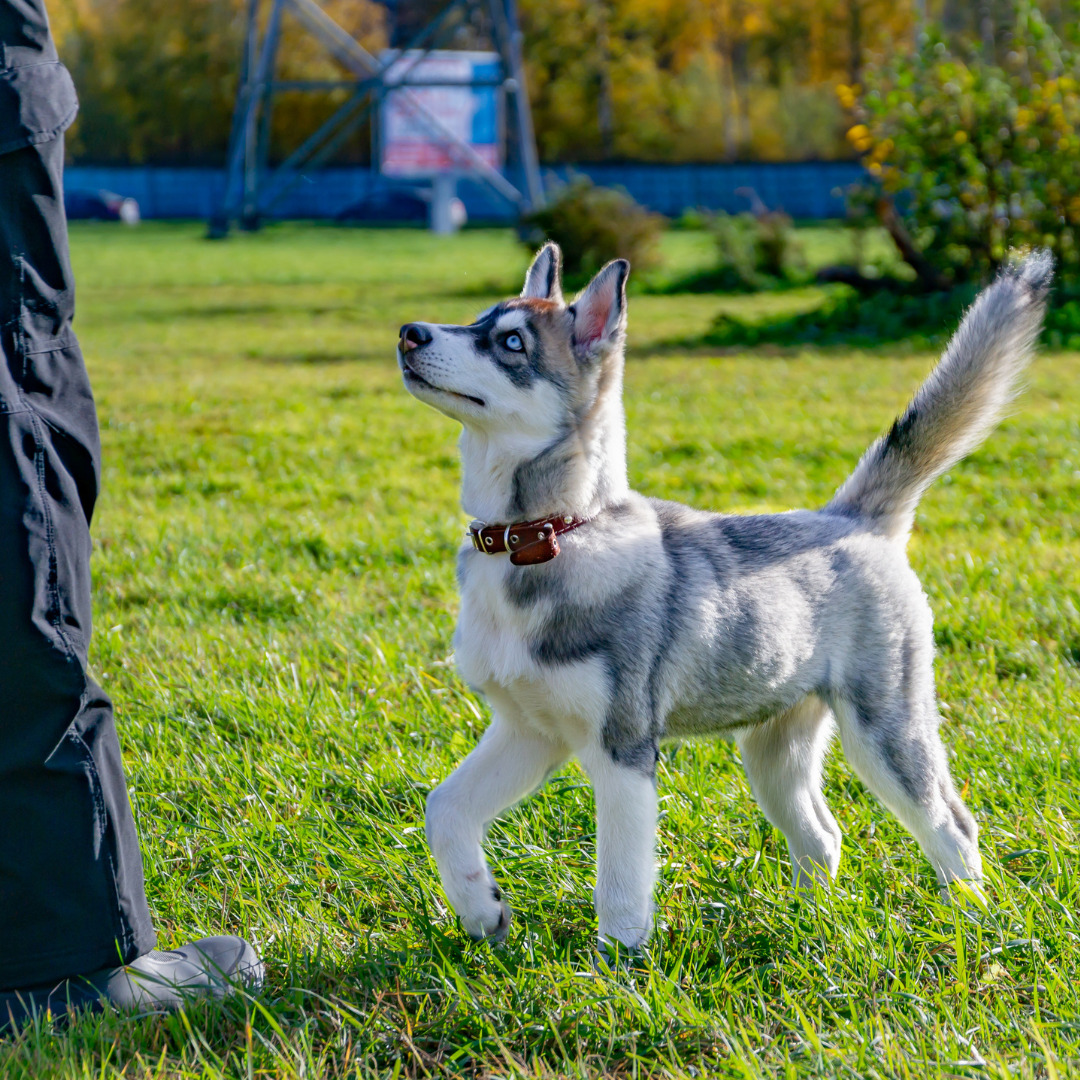Long Haired Weimaraners are a rare variation with an elegant appearance. Their long, wavy coat requires extra grooming. These dogs are friendly, highly intelligent, and need regular exercise to match their energy level. They form strong bonds with families, especially children. Proper training and socialization are vital for their pack mentality. Long Haired Weimaraners are protective but not excessive droolers, exhibiting a moderate drooling level. Learn more about their unique grooming needs and loyal temperament for a complete understanding of this special breed.
Breeding & puppyhood
During the breeding process of Weimaraners, careful selection of parents and proper puppy care during their early development are crucial steps in maintaining the breed’s health and temperament.
Responsible breeders focus on selecting parent dogs with desirable traits such as good health, sound temperament, and adherence to breed standards. This careful selection helps in reducing the likelihood of hereditary health issues and ensures that the puppies inherit positive characteristics from their parents.
Additionally, providing proper care during the crucial early development stages of the puppies is essential for their overall well-being. This includes appropriate nutrition, socialization, and training to foster good behavior and a strong bond with humans.
Early exposure to various stimuli and experiences helps in shaping the puppies’ personalities and ensures they grow up to be well-adjusted and confident adult dogs. By prioritizing these aspects in the breeding and early development stages, breeders contribute to the preservation of the Weimaraner breed’s distinctive traits and characteristics.
Appearance
In considering the Weimaraner breed, a notable aspect worthy of exploration is their distinctive appearance.
- Aristocratic Presence: Weimaraners exhibit an aristocratic and elegant appearance with a well-muscled, balanced body that reflects their hunting heritage.
- Athletic Build: These medium to large hunting dogs have a well-proportioned body, showcasing good driving power from the rear, which enhances their agility and speed.
- Distinctive Coat: While the standard Weimaraner has a sleek, short coat in shades of grey, the long-haired variation also exists, adding a touch of uniqueness to their appearance.
- Conformation for Function: The Weimaraner’s conformation is designed to support its hunting abilities, with a body length to height at withers ratio of approximately 12:11, emphasizing their athleticism and agility.
The Weimaraner’s appearance not only highlights their regal demeanor but also serves a functional purpose, reflecting their history as skilled hunting companions.
Personality
The Weimaraner’s personality is characterized by its friendly demeanor and strong sense of loyalty towards its owners. This breed is known for being friendly, obedient, and protective, forming a close bond with its family. Weimaraners are passionate hunting dogs, displaying fearlessness and a high level of loyalty. They are not aggressive but are known for their protective nature and willingness to defend their loved ones.
| Personality Traits | Description |
|---|---|
| Friendly | Weimaraners are sociable and enjoy interacting with people and other pets. |
| Intelligent | This breed is highly intelligent, making them quick learners and responsive to training. |
| Energetic | Weimaraners have a high energy level and require regular exercise to stay happy and healthy. |
| Affectionate | They are affectionate dogs that form strong bonds with their families and seek companionship. |
| Protective | Weimaraners are naturally protective of their owners and will alert them to any potential threats. |
Affectionate With Family
With a strong sense of loyalty and affection, the Weimaraner is known for forming deep bonds with its family members. This breed thrives on companionship and closeness to its human pack. Here are some key aspects that highlight the affectionate nature of the Weimaraner with its family:
- Constant Companionship: Weimaraners love to be near their family members, often following them from room to room and seeking physical contact through leaning or cuddling.
- Emotional Sensitivity: They are attuned to the emotions of their owners and are quick to offer comfort and support when needed.
- Playful Interaction: Weimaraners enjoy engaging in interactive play with their family, whether it’s a game of fetch, a run in the park, or just some quality time together.
- Protective Instincts: While being affectionate, Weimaraners also exhibit a protective nature towards their family, making them excellent watchdogs and loyal companions.
Good With Young Children
When considering the Weimaraner’s compatibility with young children, their protective instincts and gentle demeanor are notable attributes. Weimaraners are known to form strong bonds with their human family members, including children, and often exhibit a patient and tolerant attitude towards them. This breed’s inherent loyalty and affection make them well-suited for households with young kids, as they tend to be watchful over the little ones and are generally gentle in their interactions.
Weimaraners can be playful and energetic, which can align well with the active nature of children. Their high energy levels often match the enthusiasm of kids, making them potential companions in playtime activities. However, as with any dog breed, supervision is crucial when Weimaraners and children interact to ensure that both parties are safe and respectful of each other’s boundaries.
Good With Other Dogs
Interacting harmoniously with canine companions is a characteristic often exhibited by the Weimaraner breed. This breed’s sociable nature and friendly demeanor make them generally good with other dogs. Here are some key points to consider regarding the Weimaraner’s interaction with other dogs:
- Social by Nature: Weimaraners are social animals that typically enjoy the company of other dogs, especially when properly socialized from a young age.
- Playful Demeanor: Their playful and energetic nature often translates well into positive interactions with other dogs, making them great playmates.
- Pack Mentality: Weimaraners have a strong pack mentality, which can contribute to their ability to get along well with other dogs in a group setting.
- Training Importance: Proper training and socialization play crucial roles in ensuring that Weimaraners maintain good behavior and positive relationships with other dogs.
Shedding Level
The shedding level of Weimaraner dogs is a significant aspect to consider for prospective owners due to the breed’s coat characteristics and maintenance requirements. Weimaraners are moderate shedders throughout the year, with a more pronounced shedding season during spring and fall.
Their short, sleek coats are easy to maintain with regular brushing to remove loose fur and distribute natural oils. However, their long-haired counterparts require more attention to prevent matting and tangling, especially in feathered areas like legs and ears.
Providing a balanced diet rich in essential nutrients can help maintain a healthy coat and minimize excessive shedding. Additionally, regular baths and grooming sessions can aid in managing shedding and keeping the coat in good condition.
Prospective owners should be prepared for regular grooming sessions to manage the shedding level of both short and long-haired Weimaraners effectively.
Coat Grooming Frequency
Maintaining the coat grooming frequency for Weimaraner dogs is essential for preserving their overall health and appearance. Proper grooming not only keeps their coat looking neat but also helps in detecting any skin issues early on.
Here are some tips to guide you in grooming your long-haired Weimaraner:
- Brushing: Regular brushing is crucial to prevent matting and remove loose hair. Aim to brush your Weimaraner’s long coat at least 2-3 times a week to keep it tangle-free.
- Bathing: Bathing your Weimaraner should be done occasionally to keep their coat clean and fresh. Use a gentle dog shampoo and ensure thorough rinsing to avoid skin irritation.
- Trimming: While long-haired Weimaraners do not require frequent trimming, regular trimming around the feet and ears can help maintain cleanliness and prevent infections.
- Ear Care: Check and clean your Weimaraner’s ears weekly to prevent wax buildup and infections. Use a vet-approved ear cleaning solution and cotton balls to gently wipe the ears.
Drooling Level
To gauge the drooling level of a Weimaraner, observe their behavior and physical characteristics during various activities. Weimaraners are not known to be excessive droolers compared to some other breeds. While individual dogs may vary, in general, Weimaraners have a moderate drooling level. During exercise or moments of excitement, some drooling may occur, but it is typically not a prominent characteristic of this breed.
Factors such as age, health, and stress levels can also influence drooling in Weimaraners. Younger dogs may drool more, especially during teething. Additionally, if a Weimaraner is feeling anxious or unwell, it may lead to an increase in drooling. Keeping an eye on your dog’s drooling habits can provide insights into their overall well-being.
Coat Type
Characterized by its unique genetic trait, the Weimaraner’s coat type distinguishes it from other breeds in the canine world. When considering a Weimaraner’s coat type, several key points come to light:
- Short-Haired Weimaraners: The more common type, featuring a sleek, smooth coat that is easy to maintain and sheds moderately.
- Long-Haired Weimaraners: A rarer variation with a longer, wavy coat that requires more grooming to prevent matting and tangling.
- FGF5 Gene Control: Long hair in Weimaraners is controlled by the FGF5 gene, influencing the length and texture of the coat.
- Recognition by Kennel Clubs: While long-haired Weimaraners are recognized separately in most kennel clubs, they may not always align with breed standards set by organizations like the AKC.
Coat Length
Long-haired Weimaraners possess a distinctive coat length that sets them apart from their short-haired counterparts. The long-haired variation of the Weimaraner breed is characterized by a flowing and silky coat that is longer in length compared to the sleek and short coat of the traditional Weimaraner. The long-haired Weimaraner’s coat is generally feathered on the ears, legs, and tail, adding to its elegant appearance. This unique coat length contributes to the breed’s aristocratic and regal look, distinguishing it as a striking and beautiful dog.
Maintaining the coat of a long-haired Weimaraner requires regular grooming to prevent matting and tangling. Brushing the coat several times a week helps to keep it in good condition and reduces shedding. Additionally, attention should be given to the feathered areas to ensure they remain free of debris and mats. Proper coat care not only enhances the dog’s appearance but also promotes its overall health and well-being.
Openness To Strangers
Weimaraners’ demeanor towards unfamiliar individuals, particularly in terms of their receptiveness and behavior, falls under scrutiny when evaluating their social interactions, shedding light on their Openness To Strangers. This breed’s attitude towards strangers can vary based on individual personality and socialization experiences. Understanding how Weimaraners typically approach unfamiliar people is crucial for owners to manage interactions effectively.
To provide insights into the Openness To Strangers of Long Haired Weimaraners, consider the following:
- Socialization: Early and consistent socialization plays a significant role in shaping a Weimaraner’s comfort level with strangers.
- Temperament: The breed’s general temperament as friendly, obedient, and protective can influence their initial reactions to new individuals.
- Training: Proper training focusing on positive reinforcement can help instill good manners and confidence when encountering strangers.
- Genetic Factors: Some Weimaraners may have a natural inclination towards being more reserved or aloof with unfamiliar people due to their breeding history.
Playfulness Level
With their high energy and lively nature, Weimaraners exhibit a playful demeanor that enriches their interactions with both humans and other animals. This breed’s playfulness level is often described as exuberant and enthusiastic. Weimaraners thrive on engaging in various activities that challenge their physical and mental abilities. Their playful nature makes them excellent companions for active individuals or families who enjoy outdoor adventures, such as hiking, running, or playing fetch.
Weimaraners’ playful disposition also extends to their interactions with other pets, as they enjoy socializing and engaging in games that stimulate their intelligence. It is essential to provide adequate outlets for their energy to prevent boredom and potentially destructive behaviors. Interactive toys, agility training, and regular exercise routines are beneficial for maintaining their playful spirit. Additionally, incorporating training sessions into playtime can help channel their energy positively and strengthen the bond between the Weimaraner and their human companions.
Watchdog/Protective Nature
The Weimaraner breed is known for its innate watchdog instincts and protective nature, making them vigilant and loyal guardians of their families and homes.
Here are some key points that highlight the watchdog and protective nature of the Weimaraner:
- Alertness: Weimaraners are naturally alert and attentive, making them quick to pick up on any potential threats or intrusions in their environment.
- Courageous: With a fearless demeanor, Weimaraners are not easily intimidated, showing courage when faced with unfamiliar situations or individuals.
- Territorial Instincts: These dogs have strong territorial instincts, often marking and protecting their living spaces, which contributes to their role as effective watchdogs.
- Loyal Guardians: Weimaraners form strong bonds with their families and will go to great lengths to protect them, showcasing their loyalty and dedication as guardians.
Adaptability Level
Known for their innate watchdog instincts and protective nature, the adaptability level of the Weimaraner breed reflects their ability to acclimate to various environments and situations. Weimaraners are known for their versatility and can adapt well to different living conditions, whether it be in a city apartment or a spacious rural home.
Their high energy levels make them well-suited for active families or individuals who can provide them with ample exercise and mental stimulation. This breed thrives on human companionship and may experience separation anxiety if left alone for extended periods.
Weimaraners are social animals that enjoy being part of family activities, but they also require early socialization to ensure they get along well with other pets and people. Their protective instincts make them excellent guard dogs, but proper training is essential to manage any potential guarding behaviors.
Trainability Level
Is the Weimaraner breed characterized by a high level of trainability and intelligence?
Weimaraners are known for their intelligence and eagerness to please, making them highly trainable dogs. Here are four key reasons why the Weimaraner is considered to have a high trainability level:
- Intelligence: Weimaraners are intelligent dogs that quickly pick up on commands and tasks. Their ability to understand and learn new behaviors makes training sessions more effective and enjoyable.
- Eagerness to Please: These dogs have a strong desire to please their owners, which motivates them during training sessions. Positive reinforcement techniques work well with Weimaraners due to their eagerness to receive praise and rewards.
- Work Ethic: Bred as hunting dogs, Weimaraners have a natural work ethic and are willing to engage in various activities. This characteristic makes them adaptable to different training scenarios and tasks.
- Consistency: Weimaraners respond well to consistent training methods and routines. Establishing clear expectations and boundaries helps them understand what is required, leading to successful training outcomes.
Energy Level
With a boundless wellspring of vitality, the Weimaraner showcases a remarkable energy level that fuels their active and dynamic nature. This breed’s high energy levels make them well-suited for various activities that require endurance and stamina. Weimaraners thrive on physical exercise and mental stimulation, needing ample opportunities to release their pent-up energy.
Whether it’s engaging in outdoor adventures, running, playing fetch, or participating in canine sports, these dogs require regular exercise to maintain their physical and mental well-being.
Due to their robust energy levels, Weimaraners are not well-suited for sedentary lifestyles or apartment living. Without proper outlets for their energy, they may exhibit destructive behaviors out of boredom or frustration. It is crucial for owners to provide them with sufficient exercise and mental challenges to prevent behavioral issues.
Regular activities like long walks, jogs, or agility training sessions can help fulfill their energy requirements and keep them content and well-balanced.
Barking Level
The Weimaraner’s propensity for vocalization is an aspect of their behavior that warrants consideration, particularly when evaluating their barking level. Understanding the barking tendencies of this breed is essential for potential owners to determine if the Weimaraner’s vocal nature aligns with their living situation and preferences.
- Alertness: Weimaraners are naturally alert dogs, quick to pick up on changes in their environment. This heightened sense of alertness can lead to more frequent barking in response to stimuli such as noises, strangers, or unfamiliar activities.
- Territorial Behavior: Due to their protective instincts, Weimaraners may bark to alert their owners of perceived threats to their territory. This territorial behavior can result in increased barking, especially in situations where the dog feels the need to defend its home or family.
- Loneliness: Weimaraners thrive on human companionship and can become vocal when feeling lonely or isolated. Lack of social interaction and mental stimulation may trigger excessive barking as a form of seeking attention or alleviating boredom.
- Training Impact: Proper training and socialization can help manage the barking tendencies of Weimaraners. Consistent training methods focusing on positive reinforcement and addressing the root causes of barking behaviors can contribute to reducing excessive vocalization in this breed.
Mental Stimulation Needs
To ensure the overall well-being and contentment of a Weimaraner, addressing their mental stimulation needs is crucial in fulfilling their cognitive and behavioral requirements. Weimaraners are high-energy and intelligent dogs that thrive on mental challenges. Providing activities that engage their minds is essential to prevent boredom, which can lead to destructive behaviors. Puzzle toys, interactive games, and obedience training are effective ways to keep them mentally stimulated. Additionally, regular exercise, such as long walks or runs, can help satisfy their physical and mental needs.
Weimaraners are known for their problem-solving skills and eagerness to learn, making them highly trainable. Mental stimulation not only keeps them entertained but also helps build their confidence and strengthen the bond between the dog and its owner. Neglecting their mental needs can result in anxiety, restlessness, and attention-seeking behaviors. Therefore, incorporating mental exercises into their daily routine is vital for a happy and well-adjusted Weimaraner.
Conclusion
In conclusion, the Long Haired Weimaraner is a unique breed known for its elegance, high energy levels, and loyalty. Originating in Germany, these dogs were historically bred for tracking large game and were favored by royalty.
Renowned for their intelligence, this breed requires early training and ample physical and mental stimulation. Long Haired Weimaraners make excellent companions for active families willing to provide the care and attention they need to thrive.




